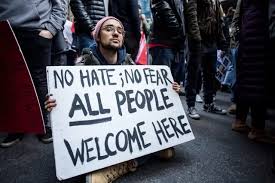A Just Transition to a Regenerative Economy’ must end wars, military culture, and the violence of militarized forces and police in our communities and across the world. [Sha Merirei Ongelungel / Indigenous Peoples’ Network]
War on the Planet: An Exploration of the Local, National, and Worldwide Connections Between Imperialism, Militarism, Environmental Destruction, and Climate Chaos
A presentation at the Triennial Congress of the Women’s International League for Peace and Freedom (WILPF) on June 1, 2024. Expanded version.
Is empire really dying?
If, as Boris Johnson predicts, Western powers lose the war in Ukraine will Western hegemony die?
In his Geopolitical Economy Report Ben Norton discusses ex-UK prime minister Boris Johnson’s point of view, which while published in a right-wing British tabloid is not propaganda. This belief by Johnson and also by Biden and Company as well as right-wing Republicans is driving the U.S. Congress to grant billions of dollars for war.
As Norton states:
It is only the Global North, or the collective West, that has imposed sanctions on Russia: North America, Europe, Australia, New Zealand and US allies in Japan, South Korea, and China’s Taiwan province (which is governed by pro-Western political forces).
The view of the end of Western hegemony was expressed earlier this year by European Union foreign policy chief Josep Borrell who said that the “era of Western dominance has indeed definitely ended.”
It appears that the continued funding of the Ukraine war (re Russia), of Taiwan (re China) and of Israel in the Middle East in spite of worldwide opposition to the genocide, is clearly about hegemonic domination, also described by a more old-fashioned word, empire.
In the antiwar/pro-peace movement we often say we don’t understand the motivation of the continued funding of the wars when in America our own people are suffering. When the ruling elite and media say the economy is healthy, what they mean is the petro dollar still dominates and drives the economy. As Ken Pentel of the Economy Democracy Network explains, the petro dollar (petroleum or oil dollar) is at the root of the economy, driving everything from transportation to food, to plastic, to housing, and so much of what we produce. In other words, the economy built on the petro dollar is threatened; U.S. and Western hegemony therefore is threatened. “It’s [still] the economy, stupid.”
Photo: Yes! Magazine
What complicates things exponentially is the climate crisis and the ‘on the ground’ battles for oil resources and other precious minerals, and now wars over water. As long as the West dominates it has access to these resources in the neo-colonial policies that characterize the relationship of the multinational corporations with countries of the Global South, which basically means they are robbing them blind.
Nation- and worldwide, people are addressing these problems by challenging the system piecemeal, including the financial system that supports it all, by calling out the banks and the corporations they fund, while the CEOs and stockholders thrive at the expense of their workers. But they are being challenged by union movements and by addressing poverty, hunger, and homelessness in an economy that basically makes the rich richer and the poor poorer.
It is not just the U.S. that is involved: France’s Totàl Energies and China are planning to build an oil pipeline across central Africa, ignoring the climate crisis, which, along with nuclear war, is the greatest threat to humanity at the present time. We are beyond stopping climate chaos, but still need to mitigate it as much as humanly possible.
If we do not do something about the climate crisis that is in the process of enveloping us all, we endanger the world.
Melissa Garriga of Code Pink explains that “We can shift from endless growth toward genuine well-being by valuing air quality, food security, and environmental sustainability.” Instead of the GDP (Gross Domestic Product) we could use the GPI to measure the economy, the Genuine Progress Indicator, that puts the military in the category of Expenses where it belongs, and stop a never-ending cycle that “masks the actual cost of conflict, prioritizing financial profit over genuine progress in education, healthcare, and biodiversity.”
Fossil fuel is, as we know, the greatest cause of global warming, and the U.S. with our 1000 military bases worldwide, is the greatest fossil fuel perpetrator in the world. But there is another massive threat a well: Above all, Water is Life.
A new pipeline in threat in Minnesota is the proposed Pipestone pipeline through sacred native land ─ just like Standing Rock and Line 3 ─ at the national monument at Pipestone, where for centuries the blood-red stone has been used to create pipes for ceremony and found in other parts of the country.
 Paypal/Card Other Options
Paypal/Card Other Options
Support Independent Media
Many communities around the country and the world are taking action; even if not seeing the full connections, we do know what is at stake.
“Justice at the heart of climate activism.” is the title of an article in Yes! Magazine that emphasizes intersectionality and the connections. Women-led groups such as the Asian Pacific Environmental Network and Intersectional Environmentalist have an intersectional understanding of climate activism.
To quote Vivian Huang of the Asian Pacific Environmental Network: “The lives of [our] members ─ like the lives of all people ─ are impacted by many intersecting issues. Members don’t just care about the air pollution impacting their health; they also care about economic opportunities, access to livelihoods, and addressing the racial injustice that they see…,” as we understand “the many ways that racial justice, economic justice, and climate justice intersect” and directly and indirectly affect our lives.
The work of the activist group Intersectional Environmentalist involves “not just self-identified environmentalists, but also housing advocates, food sovereignty activists, engineers, doctors [nurses], artists, poets ─ anyone who cares about people and the planet.” And of course water protectors of all stripes.
The conclusion: “Real safety comes from us having what we need. It comes from our communities having stable housing, good jobs, health care, connection─a cohesion with one another,” says Huang.
“Climate justice, will come from affirming the rights of political, economic, and cultural self-determination for all peoples.”
Climate justice does not come from neoliberal capitalism on steroids and the use of fossil fuel driving global warming and the contamination of our water, and not from a military build-up the world over that exacerbates the climate crisis, creates fear, and puts all our lives in danger, especially those at the bottom of the economy, and of course the threat of nuclear war. But safety and security do not come from holding us in fear.
In the union movement there is a saying, “An injury to one is an injury to all.” The same applies to climate justice: We are all connected: people dying in Gaza, people dying in the Global South from heat and floods, people suffering in Okinawa and Hawaii from the pollution of water by PFAS in U.S. military bases and worldwide, people in Phillips neighborhood who suffer from the air pollution by the Smith Foundry…and probably something similar in your neighborhood.
The victory is worth mentioning of the East Phillips Neighborhood Institute, a multicultural coalition of neighborhood members in Minneapolis who have prevented a proposed polluting truck depot and in its place will have an Urban Farm and a community center. Victories accomplished by neighborhood and community groups across the country or internationally do not make the national news if they are even fortunate enough to get on the local news. To the shame of the mainstream corporate media, only violence seems to make it to their news coverage.
As we work in our respective groups we need to hold the U.S. military accountable and make and mention the connections with similar struggles in other parts of the country and world. With Ferguson, intersectionality took the form of Palestinian flags that made a statement. At minimum we need to recognize genocide and apartheid in other parts of the world (including our own against Black and indigenous people) when talking about Gaza. We need to talk about the military’s contribution to the effects of PFAS. Above all we need to mention and raise awareness that U.S. insistence on world domination through the military is exacerbating the climate crisis worldwide. The U.S. military and its contaminating use of fossil fuels needs to be mentioned along with the destructive ECOcide that accompanies war and is rampant in Yemen, in Ukraine, and of course in Gaza.
The earth, the air, the water… The commons…
The health of the planet and of the people is connected. The modern ecological movement understands those connections but does not always see the connections to the specter of militarism. Educator/Scholar/Activist Henry Giroux calls upon us to see the international connections, the intersectionality, and the need for connection and collaboration. We need to and are continuing to develop the new modes of politics he calls for:
Power is global and politics is local. That must change. We need a new language for understanding new global power formations as well as new international modes of politics to fight them.
Social movements must move outside of national boundaries and join with others across the globe to fight the savagery of neoliberal global politics and central to such a task is the work of intellectuals, artists, cultural workers, and others who can fashion new tools and social movements in the fight against the current anti-democratic threats being imposed all over the globe.
Our tech world, for all its advantages, can isolate and separate us from each other. It does not, and cannot, replace human contact and Community.
Hope lies in Community: Cultivate Collaborative Communities, Normalize Resistance, do not forget to Rest in order to Rise. And, as the indefatigable Molly Ivins recommended, “Don’t forget to have some fun.” The future of the planet depends on us all.
_____________________________________________
NOTES
Note: Often there is confusion over the terms Liberal and Neoliberal. Because of the confusion they appear to have formed a new word, ‘illiberal.’ ”Neoliberalism is distinct from Liberalism insofar as it does not advocate laissez-faire economic policy, but instead is highly constructivist and advocates a strong state to bring about market-like reforms in every aspect of society.” (Wikipedia)
While true liberal democracies protect individual rights and freedoms, illiberal democracies do not. Elections in an illiberal democracy are often manipulated or rigged, being used to legitimize and consolidate the incumbent rather than to choose the country’s leaders and policies. As U.S. citizens we live with neoliberal/illiberal policies that have often applied, and still apply, in elections. Meanwhile there is an active countermovement to restore voter rights.
Henry A. Giroux
Henry Giroux explains in several of his articles and books that Neoliberalism is destructive capitalism and authoritarian. He is on Facebook and often publishes on Truthout.org, as well as in scholarly journals. He is the author of several books, including America at War with Itself.
Power is global and politics is local. That must change. We need a new language for understanding new global power formations as well as new international modes of politics to fight them. Social movements must move outside of national boundaries and join with others across the globe to fight the savagery of neoliberal global politics and central to such a task is the work of intellectuals, artists, cultural workers, and others who can fashion new tools and social movements in the fight against the current anti-democratic threats being imposed all over the globe.
https://truthout.org/articles/a-critical-interview-with-henry-giroux
_______________________________
Justice at the Heart of Climate Activism
By Breanna Draxler
Yes! Magazine Winter 2022
The latest issue of Yes! (Summer 2024) entitled ACCESS is also recommended.
https://www.yesmagazine.org/issues/access
________________________________
Ben Norton: Geopolitical Economy Report
If Ukraine loses war, it will be ‘end of Western hegemony’, warns UK’s Boris Johnson…
If Ukraine loses in the NATO proxy war with Russia, “it will be the end of Western hegemony”, lamented former British Prime Minister Boris Johnson…
https://geopoliticaleconomy.com/2024/04/24/ukraine-loses-war-end-western-hegemony-boris-johnson
https://youtu.be/M8ZmkIhs8r0?si=QNNVYdWQPkTyv6z9
_________________________
Ecology Democracy Network
We are living approximately 70% beyond the biocapacity of Earth to replenish
Highlights the deficiencies using the Gross State Product (GSP)/Gross Domestic Product (GDP) to calculate the economic forecast and that a better measurement for our overall well-being would be to use the Genuine Progress Indicator (GPI)
http://ecologydemocracynetwork.org
__________________________________________+__
Rejecting the Facade: Unveilingn the Ecological
Toll of War and Genocide
By Melissa Garriga, Code Pink
We can shift from endless growth towards genuine well-being by valuing air quality, food security, and environmental sustainability.
________________________________
Climate Change: Why Internationalism?
Across the globe, we’re seeing the impacts of climate change — particularly in the Global South, while wealthy countries like the U.S. and others continue to play a disproportionate role in fueling the climate crisis.
Excellent presentations by Shemona Moreno of Seattle re building solidarity with global movements; Marc Rosenthal from Wisconsin with a focus on pipeines (Enbridge) and cross-border solidarity; Ferron Pedro describes the Stop EACOP campaign (East African Oil Pipeline) a pipeline that will cross central Africa (massive crude oil through the heart of Africa, 54 million tons of carbon per year) proposed by France’s Totàl Energies (a corporation) and China National Offshore Corporation; EACOP insurers are located in the U.S. Also outdated coal power plants in So. Africa; Daniel Hunter presents 350’s international history and current status.
https://riseuptimes.org/2024/04/01/climate-change-why-internationalism
Following this presentation is information about another water issue by Friends of the Boundary Waters.
I want to mention Cary Griffith’s book Gunflint Falling: Blowdown in the Boundary Waters. On July 4, 1999, in the Boundary Waters Canoe Area Wilderness (BWCAW), a bizarre confluence of meteorological events resulted in the most damaging blowdown in the region’s history. Originating over the Dakotas, the midsummer windstorm developed amid unusually high heat and water-saturated forests and moved steadily east, bearing down on Fargo, North Dakota, and damaging land as it crossed the Minnesota border. Gunflint Falling tells the story of this devastating storm from the perspectives of those who were on the ground before, during, and after the catastrophic event—from first-time visitors to the north woods to returning paddlers to Forest Service Rangers. Published this year by the University of Minnesota Press. I was there, camping and canoeing with two friends. Our story is told in this book. Website: https://www.carygriffith.com/




